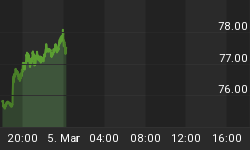"Socialism is the philosophy of failure, the creed of ignorance and the gospel of envy," said Winston Churchill. Although it inevitably lowers living standards, socialism feels good - at least at the outset - as "free money" flows in great abundance. Keep this in mind as we examine the "good news" about consumer confidence.
Last week, it was reported that consumer confidence has seen an unexpected lift. In response, the sluggish stock market saw a manic 196-point rally.
This mania overrode losses from the week's other big news: Great Britain was put on negative credit watch by Standard & Poor's; the U.S. markets tanked on expectations of a similar downgrade domestically; and, Case-Shiller reported an unrelenting slide in home prices. In other words, the economic decline continues.
So, why are consumers so confident? They are being deceived by "free money" into believing in the power of socialism.
Since the start of the crisis, the Fed has held interest rates to an artificially low level, greatly helping borrowers who can obtain credit. Also, the Administration has made it clear that it will not allow a major bank failure, even if accounting rules have to be changed to give the appearance of solvency. Including guarantees, the entitlement-based stimulus packages have sprayed trillions of dollars into the economy, with minimal oversight.
None of these policies aid recovery, nor do they allow resources to be allocated more efficiently. Instead, they prolong economic dislocation, increase the influence of the federal government, and drag America deeper into debt.
It is true that the financial collapse that threatened does appear to have been averted by "officially" hiding and avoiding the problem of toxic assets. But the lesson from Japan, which did the same, is that avoidance is no cure and will only allow the wounds to fester.
In other words, the government is forcing the bone to heal before it's been reset, so that even if we're happy to be limping now, it will be that much harder to ever correct our gait down the road.
Most of the evidence shows, with the damage done to debtor countries like America, world trade is shrinking at an alarming pace. Socialists may argue that any further economic decline will simply be met by additional government spending. But this raises a novel and alarming question: how much more can the Administration spend? Or, more critically, how much more can it borrow?
We are in an age of massive deleveraging. Cash is scarce and becoming more scarce by the day. The recession is worldwide, and even creditor nations like China are spending their reserves on internal economic stimulus. In aggregate, major debtor governments have spending plans of some $5 trillion in the near term. From where will such a substantial sum come in a world long of paper debts but suddenly short of cash?
If the U.S. Treasury fails to find buyers for its massive calendar of debt, the Fed will have to raise interest rates. This will hit all borrowings, including mortgages. It will be likely to drive consumer spending down, bankruptcies up, and unemployment to depression-era levels.
Already, with the securitization markets dead and some $3.5 trillion of underwater commercial real estate loans, America's economy looks set to take another hammer blow - a blow that might be too big for Daddy Government to handle.
Consumers may be confident that something is "being done" to solve the economic crisis, but either do not understand or have misplaced faith in what the corrective policies amount to - socialism. It may feel good now, but it is neither wise nor sustainable.
All indicators are still negative, and the government's actions have merely covered over that weakness. Indeed, it appears that the Administration is driving us deeper into recession. It is likely that, when reality dawns, the rush from the U.S. dollars, stocks, and bonds will be truly devastating.
So, ignore the vagaries of consumer confidence polling and stick to the enduring laws of economics. Production leads to stocked shelves, but looting leaves them bare.
For a more in-depth analysis of our financial problems and the inherent dangers they pose for the U.S. economy and U.S. dollar, read Peter Schiff's newest book "The Little Book of Bull Moves in Bear Markets." Click here to order your copy now.
For a look back at how Peter predicted our current problems read the 2007 bestseller "Crash Proof: How to Profit from the Coming Economic Collapse." Click here to order a copy today.
More importantly, don't wait for reality to set in. Protect your wealth and preserve your purchasing power before it's too late. Discover the best way to buy gold at www.goldyoucanfold.com. Download Euro Pacific's free Special Report, "Peter Schiff's Five Favorite Investment Choices for the Next Five Years", at http://www.europac.net/report/index_fivefavorites.asp. Subscribe to our free, on-line investment newsletter, "The Global Investor" at http://www.europac.net/newsletter/newsletter.asp. And now watch the latest episode of Peter's new video blog, "The Schiff Report", at http://www.europac.net/videoblog.asp.















